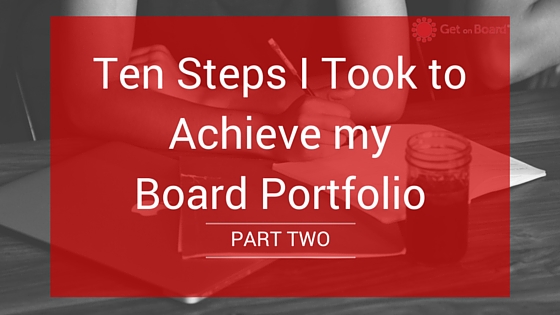Ten Steps to Building a Board Portfolio | Part Two

Last week I posted the first five steps that I took to achieve my current board portfolio (you can find it here). Today I am sharing the other five steps that helped me with my board career.
As I mentioned last week, I understand that six boards is probably not your board career goal – at the moment. You know your capacity and the number of boards you are able and willing to join. And it may change in the future as you progress along your professional career. Nonetheless, the steps that I shared last week and am sharing today will help you start your board career, whatever your aspirations are.
I networked and told people that I was interested in more board positions
I always tell aspiring directors that your network is your best asset when it comes to board opportunities. Positions on boards are generally not advertised (not necessarily a best practice move, but that’s a point for another post), but rather, new board members are sought out via current board members’ networks.
It’s what I like to call the “Network Economy” and it’s up to you whether it’s a disadvantage or an advantage. All I can do is attest that it works – at least 3 of my board appointments came via my network.
This post here shares some tips on networking for a board position.
I knew I wouldn’t get paid (yet)
As I mentioned last week, I approached my volunteer board portfolio as “on-the-job [free] training”. I see my board career as long-term, with the first five to ten years being my apprenticeship. Whilst I won’t stop seeking out larger boards and paid appointments, I have set my expectations as such that I am comfortable voluntarily committing a lot of my time and energy to boards for the medium term.
I would recommend you strongly consider taking this approach. It is unlikely that you will score a paid board position with your first board appointment. Give it time, kick butt as a volunteer director, and a paid board opportunity may just present itself.
An important note: just because you’re a volunteer, it doesn’t mean you can shirk your responsibilities (legal and otherwise) and not put in as much effort and energy as you would if you were paid. I care and commit in all of my board roles as if I am paid for each of them. It’s a minimum standard in my eyes.
I took advantage of formal education opportunities
The great thing about being a director / board member of a not-for-profit or charitable organisation is that it qualifies you for grants that pay for some or all of director development and education. I had the opportunity to have some great director training heavily subsidised for me via one of my boards.
Seek out and take these opportunities once you join a board. Not only is continual education critical for all company directors, it also makes you more attractive to other boards.
I continued (and still continue) to learn and develop myself as a board member and company director
Continuing from the point above, you have to be willing and able to be a continual learner. Much like your professional career, your board education does not only have to come in the form of formal education, as much of a focus needs to be on information education opportunities (for example, reading broadly, getting a mentor, listening to podcasts, etc.).
I believe in this point so much that I started an organisation that delivers affordable director development opportunities. You can’t get more committed than that!
Learn more about how I stay informed as a company director in this post here.
I prepared my board CV
Part of the director selection process is submitting a board resume. After freaking out about that, I scoured the internet for tips about preparing a board cv, and put together [what I think is] a neat board resume for myself. I also ensure it’s kept up to date as my board and committee positions change.
I recommend preparing one for yourself. To help you build your board cv, I have used my experience to put together a framework to follow; it can be found here. We’re also holding a short workshop and follow-up board networking event for extra help with your board resume on Thursday 12 May in Adelaide. If you’re interested in joining in, visit our event page here.
I hope these steps help you commence your board journey.
Subscribe to Receive Access to Articles, Resources, and Tools to Support Your Board Goals.
